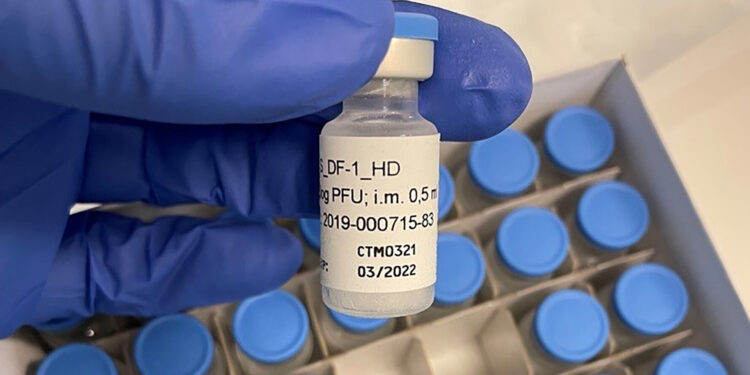The MVA-MERS-S vaccine candidate. Credit: UKE
The MERS coronavirus – MERS stands for “Middle East Respiratory Syndrome” – causes severe respiratory illnesses with a high mortality rate. To date, there is no vaccine or specific treatment. The safety, immunogenicity and optimal dosing regimen of the MVA-MERS-S vaccine candidate developed at DZIF have now been investigated in a phase Ib study in healthy individuals who have previously been infected with the related coronavirus SARS-CoV -2.
The study, led by Professor Marylyn Addo of the University Medical Center Hamburg-Eppendorf and published in Lancet infectious diseaseshas shown that the vaccine is safe and effective. Further studies of vaccine safety and effectiveness in groups at risk for severe MERS-CoV illness, including older adults and individuals with relevant comorbidities, will follow.
First identified in the Middle East in 2012, the MERS coronavirus is transmitted from camels to humans through droplet infection and can also be transmitted from person to person. The pathogen causes serious respiratory illnesses, fatal in 36% of cases. The MERS coronavirus has been classified by the World Health Organization (WHO) as particularly dangerous to public health. To date, more than 2,600 cases of MERS have been confirmed in 27 countries around the world, particularly in Saudi Arabia. To date, there is no effective vaccine or specific treatment.
The MVA-MERS-S vaccine candidate developed at the German Center for Infection Research (DZIF) since 2013 is based on an attenuated virus, called “modified Ankara vaccination virus” (MVA), which has been supplemented with protein components of the MERS virus. Results from the Phase 1B trial show that the vaccine is effective and safe, even in people with previous or concurrent infection with the SARS-CoV-2 COVID-19 pathogen.
Two different vaccine doses and two different vaccination intervals were studied in the randomized, double-blind, placebo-controlled study. The 140 subjects tested experienced isolated local reactions such as mild pain at the injection site, but no serious vaccine-related side effects.
“Further studies are now needed, particularly to verify these findings in groups at risk of severe MERS-CoV disease, such as the elderly and those with relevant comorbidities,” says Professor Addo, Director of the Institute of infection research and vaccine development at the Institute. UKE and coordinator of the DZIF Emerging Infections research area.
More information:
Matthijs P Raadsen et al, Safety, immunogenicity and optimal dosing of a modified Ankara-based vaccine against MERS-CoV in healthy adults: a phase 1b, double-blind, randomized, placebo-controlled clinical trial , Lancet infectious diseases (2024). DOI: 10.1016/S1473-3099(24)00423-7
Provided by the Deutsches Zentrum für Infektionsforschung
Quote: MERS coronavirus vaccine tested safe and effective in phase Ib clinical trial (October 21, 2024) retrieved October 21, 2024 from
This document is subject to copyright. Except for fair use for private study or research purposes, no part may be reproduced without written permission. The content is provided for informational purposes only.



